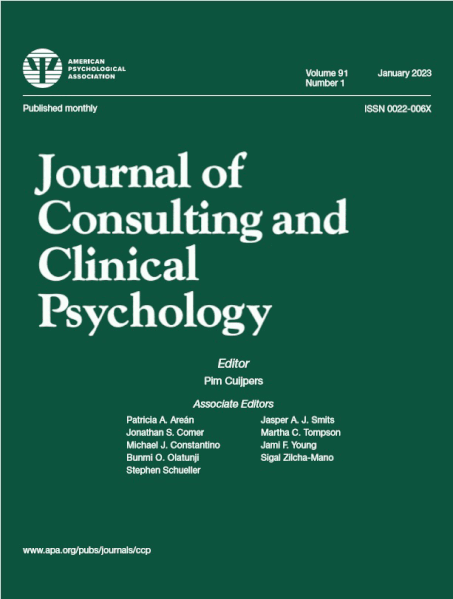Reciprocal relationships between posttraumatic stress disorder symptoms and positive and negative affect in evidence-based treatments for posttraumatic stress disorder.
IF 5
1区 心理学
Q1 PSYCHOLOGY, CLINICAL
引用次数: 0
Abstract
OBJECTIVE Posttraumatic stress disorder (PTSD) is associated with elevated negative affect (NA; e.g., Badour et al., 2017) and diminished positive affect (PA; Nawijn et al., 2015). PTSD treatments reduce NA (e.g., Jerud et al., 2014), but changes in PA and relationships between changes in affect and PTSD symptoms remain unclear. METHOD This study examined changes in PA and NA in adults (N = 130) with PTSD receiving prolonged exposure (PE) or PE plus sertraline as part of a randomized controlled trial (NCT01600456). Participants completed measures of affect (PANAS; Watson et al., 1988) and PTSD symptoms at 10 weekly treatment sessions. Cross-lagged dynamic structural equation models examined associations between session-to-session fluctuations in affect and PTSD. RESULTS PA increased moderately (d = 0.51) and NA decreased strongly (d = 0.78) across treatment sessions. Within-person fluctuations in PA and NA were generally reciprocal, PAt → NAt+1: effect size (ES) = -0.09, 95% CI [-0.15, -0.02]; NAt → PAt+1: ES = -0.20, 95% CI [-0.28, -0.13]. However, fluctuations in PTSD more strongly predicted next session NA (PTSDt → NAt+1: ES = 0.50, 95% CI [0.38, 0.60]) and PA (PTSDt → PAt+1: ES = -0.26, 95% CI [-0.34, -0.17]) than the reverse. PE augmentation with a selective serotonin reuptake inhibitor did not moderate temporal associations. CONCLUSIONS Prolonged exposure produced substantial improvements in PA and NA. General affective changes may be more a consequence than a driver of PTSD improvement during PE, with improvements in NA and PA potentially linked to the extinction of negative emotional responses to trauma cues and increased engagement with rewarding activities, respectively. (PsycInfo Database Record (c) 2024 APA, all rights reserved).创伤后应激障碍循证治疗中创伤后应激障碍症状与积极和消极情绪之间的相互关系。
目的创伤后应激障碍(PTSD)与消极情绪(NA;如 Badour 等人,2017 年)升高和积极情绪(PA;Nawijn 等人,2015 年)降低有关。创伤后应激障碍治疗可减少NA(如Jerud等人,2014年),但PA的变化以及情感变化与创伤后应激障碍症状之间的关系仍不清楚。方法本研究考察了作为随机对照试验(NCT01600456)的一部分,接受长期暴露(PE)或PE加舍曲林治疗的创伤后应激障碍成人(N = 130)中PA和NA的变化。参与者在每周 10 次的治疗过程中完成了情感测量(PANAS;Watson 等人,1988 年)和创伤后应激障碍症状测量。交叉滞后动态结构方程模型检验了各疗程之间情感波动与创伤后应激障碍之间的关联。结果 PA 在各疗程中适度增加(d = 0.51),NA 在各疗程中强烈减少(d = 0.78)。PAt → NAt+1:效应大小 (ES) = -0.09,95% CI [-0.15, -0.02];NAt → PAt+1:效应大小 (ES) = -0.20,95% CI [-0.28, -0.13]。然而,创伤后应激障碍的波动对下一疗程 NA(创伤后应激障碍 t → NAt+1:ES = 0.50,95% CI [0.38,0.60])和 PA(创伤后应激障碍 t → PAt+1:ES = -0.26,95% CI [-0.34,-0.17])的预测比反向预测更强。用选择性血清素再摄取抑制剂增强创伤后应激障碍并不能缓和时间上的关联。创伤后应激障碍在PE期间得到改善,一般情绪变化可能更多的是结果而不是驱动力,NA和PA的改善可能分别与对创伤线索的负面情绪反应的消退和对奖励活动的更多参与有关。(PsycInfo Database Record (c) 2024 APA,保留所有权利)。
本文章由计算机程序翻译,如有差异,请以英文原文为准。
求助全文
约1分钟内获得全文
求助全文
来源期刊

Journal of consulting and clinical psychology
PSYCHOLOGY, CLINICAL-
CiteScore
9.00
自引率
3.40%
发文量
94
期刊介绍:
The Journal of Consulting and Clinical Psychology® (JCCP) publishes original contributions on the following topics: the development, validity, and use of techniques of diagnosis and treatment of disordered behaviorstudies of a variety of populations that have clinical interest, including but not limited to medical patients, ethnic minorities, persons with serious mental illness, and community samplesstudies that have a cross-cultural or demographic focus and are of interest for treating behavior disordersstudies of personality and of its assessment and development where these have a clear bearing on problems of clinical dysfunction and treatmentstudies of gender, ethnicity, or sexual orientation that have a clear bearing on diagnosis, assessment, and treatmentstudies of psychosocial aspects of health behaviors. Studies that focus on populations that fall anywhere within the lifespan are considered. JCCP welcomes submissions on treatment and prevention in all areas of clinical and clinical–health psychology and especially on topics that appeal to a broad clinical–scientist and practitioner audience. JCCP encourages the submission of theory–based interventions, studies that investigate mechanisms of change, and studies of the effectiveness of treatments in real-world settings. JCCP recommends that authors of clinical trials pre-register their studies with an appropriate clinical trial registry (e.g., ClinicalTrials.gov, ClinicalTrialsRegister.eu) though both registered and unregistered trials will continue to be considered at this time.
 求助内容:
求助内容: 应助结果提醒方式:
应助结果提醒方式:


